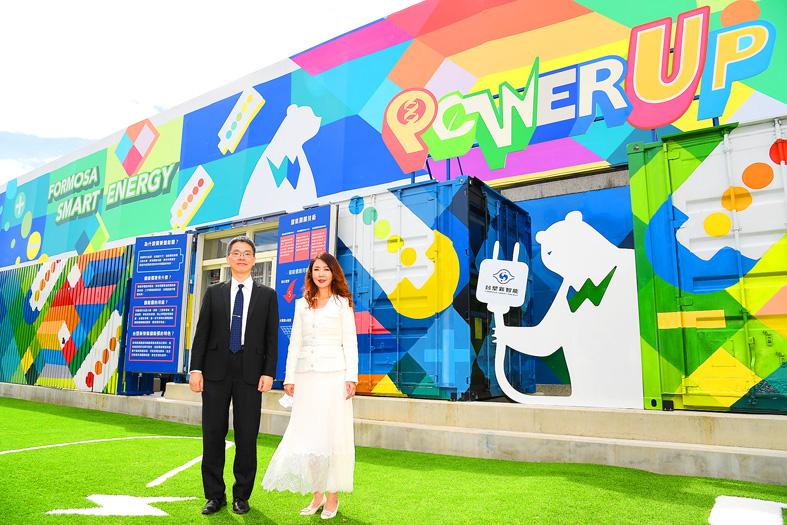Newly established Formosa Smart Energy Tech Corp (台塑新智能科技) on Tuesday said it would invest NT$16 billion (US$536.7 million) on building a green energy production base in the Changhua Coastal Industrial Park (彰濱工業區).
The investment would focus on a lithium iron phosphate (LFP) battery factory, said the company, which was launched by Formosa Plastics Group (FPG, 台塑集團).
An LFP battery and module factory with production capacity of 2.1 gigawatt-hours (GWh) would be established in the first phase, with mass production scheduled to start in the first half of 2024, Formosa Smart Energy chairwoman Sandy Wang (王瑞瑜) told a news conference in Changhua City.

Photo: Chang Hui-wen, Taipei Times
The second phase would boost production capacity to 5GWh, Wang said, without disclosing a timeline.
The production base is to cover about 6.1 hectares.
Before the planned factory starts mass production, a lithium iron battery module production line would be set up at the Changhua plant of Formosa Chemicals & Fibre Corp (台灣化纖), a listed subsidiary of FPG, to meet the needs of the new energy market, the company said.
The production line would serve as a trial site, it said.
Formosa Plastics started its battery manufacturing business more than 10 years ago, Wang said, adding that its lithium iron battery cells and modules have passed safety standard certification.
The conglomerate has also been negotiating with electric vehicle manufacturers, Wang said.
Formosa Smart Energy president Liu Hui-chi (劉慧啟) said that annual demand for batteries in Taiwan is expected to reach 7.21GWh by 2030, while global demand is forecast to reach 3,000GWh.
In addition to producing lithium iron battery cells and modules, the company would also transfer battery recycling technology developed at its factory in South Korea to Taiwan, to simultaneously produce and recyclye batteries, Liu said.
In addition to supplying uninterruptible power supply batteries to Taiwan, Japan, the US, Southeast Asia and other regions, the smart energy company would also work with partners such as Skwentex International Corp (翰可國際) and Fortune Electric Co (華城電機) to deploy an energy system that supports Taiwan Power Co’s (台電) automatic frequency control services, which play a critical role in stabilizing the nation’s power grid, it said.
The system is expected to have a capacity of more than 50 megawatts by the end of this year. Two 100-megawatt grid-level super energy storage stations are planned for the future.
The company also plans to launch a 12.2 kilowatt-hour energy storage system that can meet the power storage needs of a family of three or four for a whole day, annual sales of which could reach more than 10,000 units, it said.

When Lika Megreladze was a child, life in her native western Georgian region of Guria revolved around tea. Her mother worked for decades as a scientist at the Soviet Union’s Institute of Tea and Subtropical Crops in the village of Anaseuli, Georgia, perfecting cultivation methods for a Georgian tea industry that supplied the bulk of the vast communist state’s brews. “When I was a child, this was only my mum’s workplace. Only later I realized that it was something big,” she said. Now, the institute lies abandoned. Yellowed papers are strewn around its decaying corridors, and a statue of Soviet founder Vladimir Lenin

UNCERTAINTIES: Exports surged 34.1% and private investment grew 7.03% to outpace expectations in the first half, although US tariffs could stall momentum The Chung-Hua Institution for Economic Research (CIER, 中華經濟研究院) yesterday raised its GDP growth forecast to 3.05 percent this year on a robust first-half performance, but warned that US tariff threats and external uncertainty could stall momentum in the second half of the year. “The first half proved exceptionally strong, allowing room for optimism,” CIER president Lien Hsien-ming (連賢明) said. “But the growth momentum may slow moving forward due to US tariffs.” The tariff threat poses definite downside risks, although the scale of the impact remains unclear given the unpredictability of US President Donald Trump’s policies, Lien said. Despite the headwinds, Taiwan is likely

UNIFYING OPPOSITION: Numerous companies have registered complaints over the potential levies, bringing together rival automakers in voicing their reservations US President Donald Trump is readying plans for industry-specific tariffs to kick in alongside his country-by-country duties in two weeks, ramping up his push to reshape the US’ standing in the global trading system by penalizing purchases from abroad. Administration officials could release details of Trump’s planned 50 percent duty on copper in the days before they are set to take effect on Friday next week, a person familiar with the matter said. That is the same date Trump’s “reciprocal” levies on products from more than 100 nations are slated to begin. Trump on Tuesday said that he is likely to impose tariffs

HELPING HAND: Approving the sale of H20s could give China the edge it needs to capture market share and become the global standard, a US representative said The US President Donald Trump administration’s decision allowing Nvidia Corp to resume shipments of its H20 artificial intelligence (AI) chips to China risks bolstering Beijing’s military capabilities and expanding its capacity to compete with the US, the head of the US House Select Committee on Strategic Competition Between the United States and the Chinese Communist Party said. “The H20, which is a cost-effective and powerful AI inference chip, far surpasses China’s indigenous capability and would therefore provide a substantial increase to China’s AI development,” committee chairman John Moolenaar, a Michigan Republican, said on Friday in a letter to US Secretary of